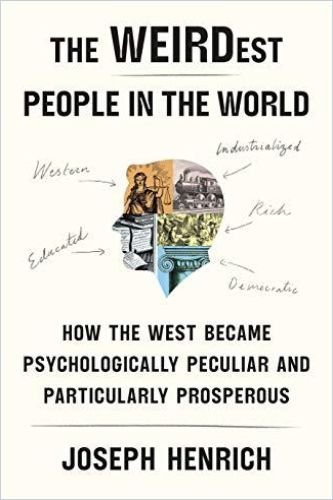Anthropologist Joseph Henrich explores the historical, cultural and anthropological forces that made Western people WEIRD.

Weird: Western, Educated, Industrialized, Rich and Democratic
In this sweeping, provocative study, anthropologist Joseph Henrich – chair of the Department of Human Evolutionary Biology at Harvard University – introduces the WEIRD psychological profile: Western, Educated, Industrialized, Rich and Democratic.
Most societies evolved kin-based institutions, but Western people opted to create societies in which the individual reigns supreme – a choice tied to the Western embrace of mobility, literacy and voluntary group membership. Joseph Henrich argues that this seismic shift spurred urbanization, modern government, industrialization, competition and innovation. Combining painstaking research with broad historical narratives, he delivers a spellbinding treatise on the psychological “dark matter” that fuels cultural evolution.
WEIRD Societies
For decades, psychologists took the Western mind for granted because their subjects were overwhelmingly European or of European descent. These WEIRD people are Western, Educated, Industrialized, Rich and Democratic. They prize individualism, obsess about themselves, seek control, analyze everything, are nonconformist and are more likely to feel guilt than shame.
A general inclination to see the world in positive-sum terms may open the psychological door to the diffusion of beliefs about human progress.Joseph Henrich
By contrast, most other human societies honor kinship-grounded institutions. Socially interdependent, members of non-WEIRD cultures conform with one another and honor their elders. They monitor behavior within their tribe or family, favor collective interests and are suspicious of anonymous authority. They prioritize “other-esteem,” and care about how their communities values them.
Culture
Around 1000 CE, Chinese or Islamic societies seemed most likely to become the forces that would dominate the globe. In 1068, a Muslim scholar wrote about the barbarians to the north, the people at edge of the populated world. From 1500 onward, Europeans conquered much of the world and fomented innovations for many reasons; the most consistent and sustained is literacy.
Literacy changes people’s biology and psychology without altering the underlying genetic code. Joseph Henrich
The brains of people in literate societies neurologically and psychologically differ from the brains of people of non-literate societies. Literacy improves communication between the brain’s left and right hemispheres, expands memory, and replaces holistic thinking with analytical visual processing. Literacy shifted humanity’s evolutionary path.
Kinship Ties
Humans learn most of their behavior by watching other humans. People determine from whom they need to learn, what they need to learn, and when to apply their learned skills or knowledge. People thus create implicit knowledge as it creates them.
Social norms arise directly from cultural learning and social interaction – that is, via cultural evolution.Joseph Henrich
The social norms group survival demands came from cultural evolution. These norms reinforce kinship ties – particularly lifelong marriage – with the implicit understanding that tribes prosper when they ally with other tribes.
Tribal alliances foster competition in which one group dominates or eliminate another, and the victor’s practices become the new norm. Over millennia, this intergroup competition fueled urbanization, institutionalized shared values and constructed national identities.
Marriage and Family Program (MFP)
For millennia, humans cultivated rituals, socialization, games and folklore to navigate their accrued cultures. These, along with agriculture, climate, ecology and history, all contributed to the West’s unique trajectory. The most significant indicator of WEIRDness is the Western – not Orthodox – church. In the early Common Era, Christianity emerged as the organizing institution that would powerfully shape WEIRD psychology.
The Church’s Marriage and Family Program – which began in the fourth century and, by the 13th, had transformed Europe –forbade marrying non-Christians or to blood relatives, or “affines,” such as a widow’s husband’s brother, for example. It disallowed polygamy and sex slaves and advocated mutual consent to marriage, mothers caring for their birth children and independent property ownership. The Program dissolved kin-based social hierarchies and replaced them with a universalizing moral narrative, with the individual at its core. This enabled higher literacy, greater mobility, impersonal marketplaces, and a focus on personal attributes and skills.
The accidental genius of Western Christianity was in figuring out how to dismantle kin-based institutions while at the same time catalyzing its own spread. Joseph Henrich
The Church replaced the tribe as the enforcer of WEIRD social norms: personal responsibility, universal morality and free will.
Forged by War
Between 1500 and 1800, European polities were at war almost 90% of the time. War gave certain groups more power, accelerated urbanization, intensified national identities and strengthened institutions. For example, the Hundred Years’ War likely created modern-day English and French identities.
War unites people around a common purpose as catastrophe forces communities to commit to norms and shared values. Henrich is unsentimental about centuries of conflicts, and so he asks quite incongruous questions: Can people domesticate war’s benefits while forgoing the negative results – mass death and destruction?
Cumulative Cultural Evolution
Innovation doesn’t come from geniuses with free time and the financial incentive to dedicate themselves to inventions. Instead, many small, cumulative decisions over hundreds of years – along with many failed experiments – spur innovation.
Innovative ideas require a fluid, diverse population unencumbered by ancestral or geographic ties. They require trust among strangers, because no one can design, build and distribute inventions without cooperation.
US counties that took in more immigrants – even when compelled to by circumstances – were subsequently more innovative, educated and prosperous. Joseph Henrich
Having more people participate in a society’s “collective brain” creates more opportunities for ideas and inventions to flourish, which fuels prosperity, which sparks more innovation.
Henrich’s thesis at times conflicts with his writing on the Church; he regards it as a beacon of individuality and free will, but the Church’s centuries-long history of suppression and enforced conformity dampens Henrich’s arguments. Elsewhere, however, his singular brilliance, compelling prose and breathtaking knowledge make this a worthwhile, fascinating historical overview.
Joseph Henrich also wrote The Secret of Our Success and co-wrote Why Humans Cooperate with Natalie Henrich.






